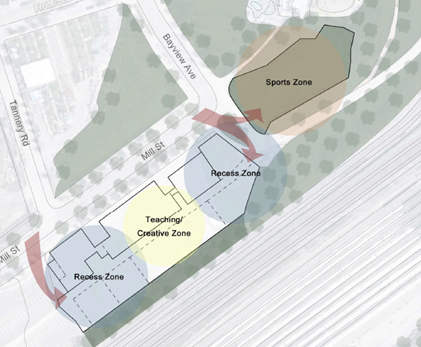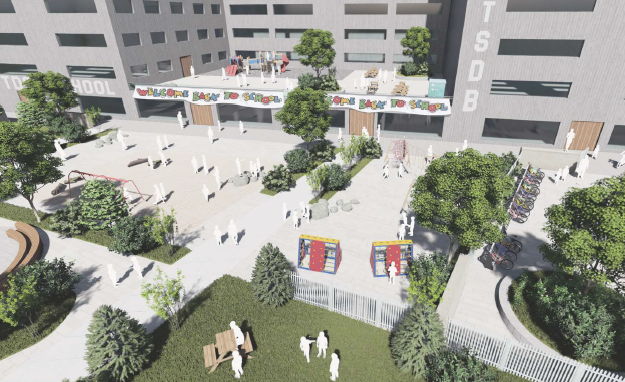Future land use planners benefitting from TLC expertise
Amar Singh, MCIP, RPP, TLC Planner
Since assuming the Land Use Planning responsibilities on behalf of the TDSB in 2018, TLC has worked hard building strong relationships with municipal, community, industry and academic stakeholders. Creating awareness and educating each group about the potential of partnering to modernize our school facilities and collaboratively redevelop TDSB properties to increase their social value is a role TLC takes seriously. Our unique position as the only company in Canada that oversees a school boards land portfolio, makes TLC an attractive destination for the post-secondary education sector and allows us to partner with universities to offer job opportunities to planning students studying in Ontario. Fostering relationships with planning students is key so that future generations of planners understand the role and importance of schools as part of complete communities.


The TDSB faces challenges with land availability and cost in intensifying areas of the city. Over the last two years , TLC partnered with the University of Toronto on their School of Cities Urban Capstone Project, providing a group of four students with the challenge of designing and integrating schoolyards in the city’s existing urban landscape through mixed-use spaces. Led by TLC Planner Paul Nichols, the project required students to consider various factors, including cost and financing, functionality, health and safety, community integration and public acceptance and sustainability. The literature review covered local and international projects that incorporated schools in mixed-use developments through innovative design and programming. TLC staff regularly met and mentored the students, helping to shape their discussions and guide them in the outcome of the final report.
In 2022, the York University graduate planning program hosted a “The Day in the Life of a Planner at TLC” as part of a Planning Skills Lab aimed at providing students a glimpse of the work TLC Planners do for Canada’s largest school board. TLC Planner Matt Bagnall presented TLC’s modernization strategy and how leveraging the TDSB’s land inventory for reinvestment can modernize the school system. The presentation also included a focus on the daily work of TLC planners on planning studies, reviewing development applications, securing new school space and urban schools in emerging communities. There was a considerable amount of student engagement following the presentation with many questions for their future career path.
Since 2020, TLC has provided seven terms of paid employment for planning students, offering opportunities for students to engage in real-life planning work, including challenges and opportunities specific to Canada’s largest school board. Allison Oki is currently working with TLC’s land use planning team while completing graduate studies at the University of Toronto’s planning program. Allison shares her experience at TLC below.
Allison Oki, TLC Planning Student
How did you first learn about TLC?
As part of the undergrad co-op program, I was searching for jobs for my final placement and saw that there was a TLC student position posted on the university’s job portal. Being in the planning program, getting more planning experience was important to me, and the job description sounded interesting. One of the things that caught my interest when I was exploring the TLC website was the innovative approach to projects describing ‘schools as -community hubs.’
What has your work experience in planning been like so far?
In my first co-op work term, I was at the site selection unit at the Ministry of Economic Development, Job Creation and Trade, which was my first planning-related position. While there, I got to understand how planning decisions are made at the provincial level and how that informs how municipalities make their plans. When I came to TLC, I started understanding planning more on a local/municipal level. I feel that having this planning work experience has made it much easier to grasp and build upon what I am learning in grad school. For example, during my studies I’ve learned about the functions of a zoning by-law, while my work experience at TLC has helped me interpret, summarize, and apply the contents of the by-law to assist in real-life projects.
What is the most interesting/enjoyable part of your TLC experience?
Writing letters to the city in response to development applications, responding to applicants’ requests for school information, taking meeting notes, and organizing and updating spreadsheets and resources are the most regular parts of my job. This is interesting because it allows me to communicate important information to different audiences. The team of land use planners I work with are great. Their breadth of expertise and commitment to modernization is impressive. I work with them on a variety of projects, each which provides fantastic learning opportunities for me to grow as a planning student. Being part of an organization that is doing these type of valuable projects across the City is very rewarding. It feels like you’re improving how planning is done and helping to innovate how schools and communities are designed.
The challenging part of the job is interpreting complicated zoning by-laws and bills and understanding them enough to write policy memos or zoning reviews. While this is not the most exciting work, it is an important skill for planners to have and it’s good to strengthen that muscle.
Will working at TLC help with your career as a planner?
“I definitely think so. I’d love to stay at TLC of course, but I feel that my time here has provided me with a lot of valuable experience that is transferable to other planning roles. I’ve learned fundamental actions of being a planner like interpreting legislation and making it easier for the public to understand. I’ve also gained insights into how the planning world operates which will help me navigate the field as I grow in my career.”
If you could share one piece of information/advice to the next generation of planners about school board planning, what would it be?
“It’s really important for current and future planners to think about innovative, modern and efficient ways to use school lands. A lot of what TLC has been trying to do is create opportunities for mixed-use development and community hubs. It’s vital that TLC and TDSB, the City and Province, and developers work together to realize these modernization opportunities, especially as the population grows and lands becomes more expensive. It’s also imperative that as these growth pressures increase, community services and facilities do as well to meet the needs of communities.”